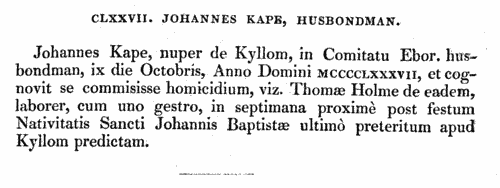Synger Surname Ancestry ResultsOur indexes 1000-1999 include entries for the spelling 'synger'. In the period you have requested, we have the following 6 records (displaying 1 to 6): Buy all | | | Get all 6 records to view, to save and print for £32.00 |
These sample scans are from the original record. You will get scans of the full pages or articles where the surname you searched for has been found. Your web browser may prevent the sample windows from opening; in this case please change your browser settings to allow pop-up windows from this site. Chester County Court (1309)
The full text of the proceedings in the county court at Chester 25 November 1309. Latin
SYNGER. Cost: £8.00.  | Sample scan, click to enlarge

| Inhabitants of Yorkshire: Harthill wapentake
(1380)
The poll tax returns for this wapentake, the area around Market Weighton, Pocklington and South Cave.SYNGER. Cost: £6.00.  | Sample scan, click to enlarge

| Clergy, the religious and the faithful in Britain and Ireland
(1471-1484)
These are abstracts of the entries relating to Great Britain and Ireland from the Lateran and Vatican Regesta of pope Sixtus IV. Many of these entries relate to clerical appointments and disputes, but there are also indults to devout laymen and women for portable altars, remission of sins, &c. This source is particularly valuable for Ireland, for which many of the key government records of this period are lost. Many of the names in the text were clearly a puzzle to the scribes in Rome, and spelling of British and Irish placenames and surnames is chaotic. Sixtus IV was consecrated and crowned 25 August 1471 (the day from which his pontificate is dated) and died at Rome 12 August 1484. The extracts were made by J. A. Twemlow from Vatican Regesta dxlvi to dclxxxi and Lateran Regesta dccxiii to dcccxxxviii, and published in 1955. Not all the Lateran registers survive from this pontificate, but were still in existence in the 18th century, when indexes were compiled giving rubricelle, or brief summaries of the papal bulls; nor, indeed, have all these indexes now survived, but Twemlow added an appendix listing all the rubricelle relating to the British Isles extant for the reign of Sixtus IV.SYNGER. Cost: £4.00.  | Sample scan, click to enlarge

| Norfolk Feet of Fines
(1307-1485)
Pedes Finium - law suits, or pretended suits, putting on record the ownership of land in Norfolk. These abstracts were prepared by Walter Rye.SYNGER. Cost: £4.00.  | Sample scan, click to enlarge

| Clerks and Clergy in Herefordshire, Shropshire and Gloucestershire
(1504-1516)
The register of bishop Richard Mayew of Hereford, containing general diocesan business, but also including ordination lists for monks and clergy. Only a small proportion of the clerks went on to acquire benefices and remained celibate. Hereford diocese covered almost all Herefordshire, southern rural Shropshire, a westward arm of Worcestershire, and a northwestern slice of Gloucestershire.SYNGER. Cost: £6.00.  | Sample scan, click to enlarge

| Murderers sheltering in Beverley Minster: and their victims
(1478-1539)
Criminals could evade pursuit by claiming sanctuary in the church of St John in Beverley, in the East Riding of Yorkshire. This liberty of the minster extended a league in every direction from the church door, and was divided into six sections, each giving greater sanctity to the rights of sanctuary, the sixth and innermost section being the presbitery or chancel. Near the altar there was a stone chair called the Frith Stool, seated on which an accused could claim total immunity. The bailiff would receive the oath of the fugitive, and a clerk recorded 'what man he killed, and wher with, and both ther namez'; the bailiff receiving a fee of 2s 4d, the clerk 4d. Sanctuary was afforded for 30 days, with food and lodging, after which the fugitive was protected to the borders of the county. But within 40 days he had to appear before the coroner, clothed in sackcloth, and be branded on his right hand with the sign of the letter A. This signified that he was swearing to abjure the realm: he was then free to leave the country unhindered. At Beverley the clerks kept a separate register of fugitives' petitions, which survives from 1478 to 1539 in Harleian Manuscript 560. It was edited and printed by the Surtees Society in 1837 under the title Sanctuarium Beverlacense. Some of the criminals came from a considerable distance: the great majority were murderers or homicides. Each entry usually gives full name, original address, (often) trade, a brief description of the crime, often with date, and usually the name of the victim. This index covers all the surnames given.SYNGER. Cost: £4.00.  | Sample scan, click to enlarge

|
Research your ancestry, family history, genealogy and one-name study by direct access to original records and archives indexed by surname.
|








